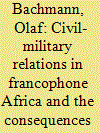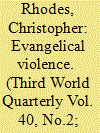| Srl | Item |
| 1 |
ID:
132271


|
|
|
|
|
| Publication |
2014.
|
| Summary/Abstract |
The Building Security Overseas Strategy is at its core an 'Intervention to end all Interventions' - from a Western as well as an African perspective. Two of its main pillars are security sector reform in specific countries and systematic support to the development of the African Peace and Security Architecture. This article addresses the question why such efforts have met little success in francophone Africa. It argues that the failure of Western advisers to understand the sociological dynamics of African armed forces, shaped by a political culture based on personal loyalty to the leader, is at the root of the problem. In that context, the Huntingtonian-type distinction between the civilians and the military does not apply as military and civilians act in concert within common clientelism systems. As a result of the curtailing of the state-formation experience in most African countries, the military never had to demonstrate its performance as a state builder, nor did it have to bargain its legitimacy against the support of the citizens. Partnership in that context will remain a misnomer, at least until African military can credibly demonstrate commitment to state-building grounded in a broad-based social contract.
|
|
|
|
|
|
|
|
|
|
|
|
|
|
|
|
| 2 |
ID:
165060


|
|
|
|
|
| Summary/Abstract |
Recognising the impact of religion on state action, this article identifies two variables that interact to affect the type and level of violence employed by Western states against Third World targets. First, variation in the degree to which the prominent Christian denominations and organisations within these states view evangelisation as either an individual-level or national-level process – Christian individualism vs Christian nationalism – has determined church support for using violence as a tactic. Second, the level of influence that churches and missionary organisations have over their home states affects the ability of Christian actors to directly impact state actions. Western violence against Third World peoples is expected to be lowest when churches and Christian organisations view evangelisation in primarily individualistic terms and have significant influence over the state. The article examines the relationships between concepts of evangelisation, Christian influence over state policies, and levels of violence against the Third World by examining British, French and German colonialism during the late colonial period of the nineteenth and twentieth centuries.
|
|
|
|
|
|
|
|
|
|
|
|
|
|
|
|